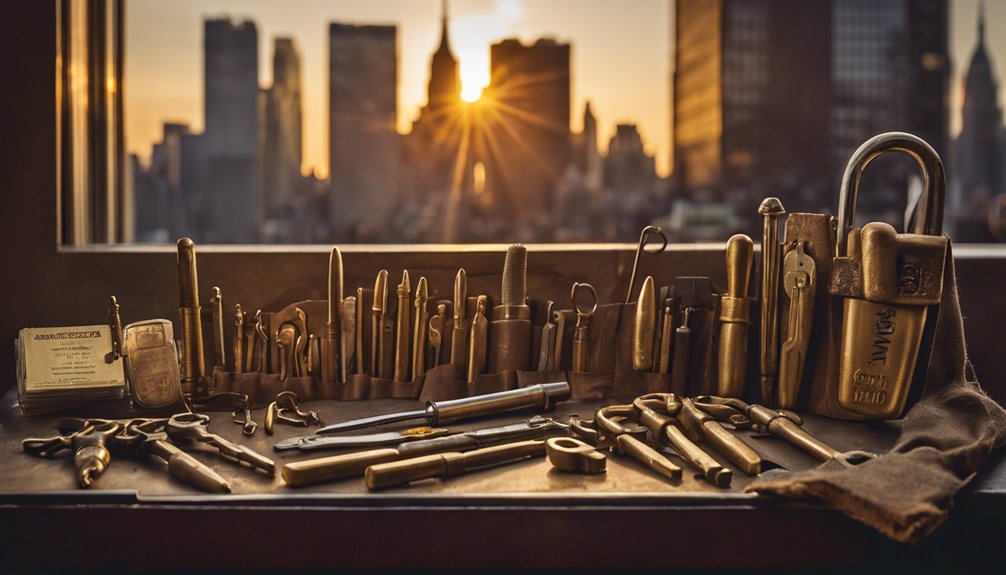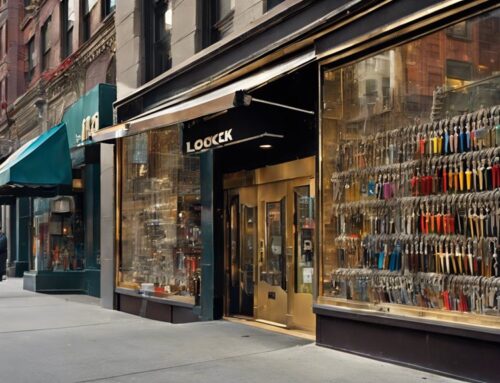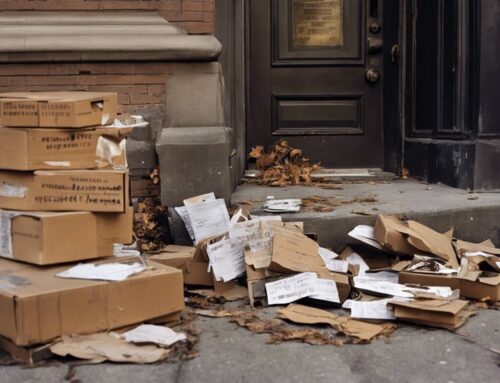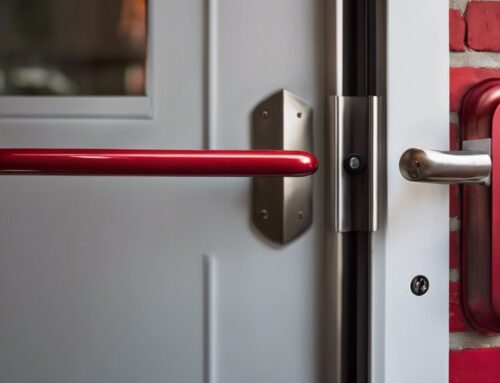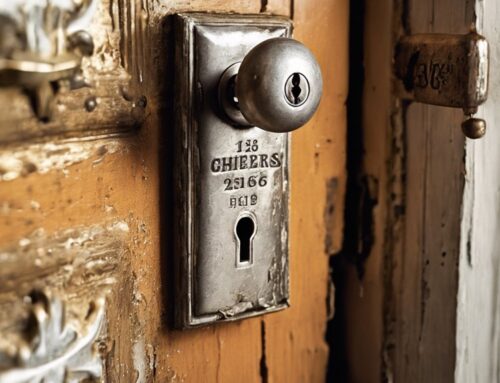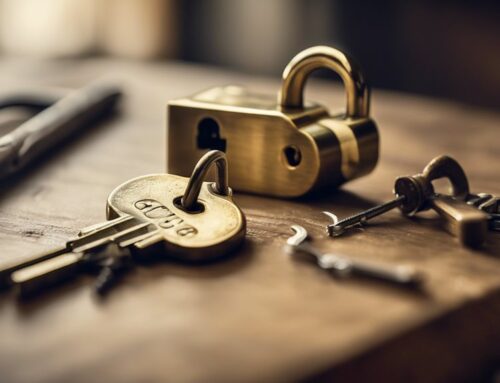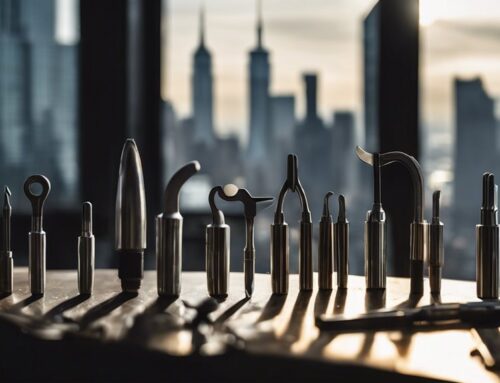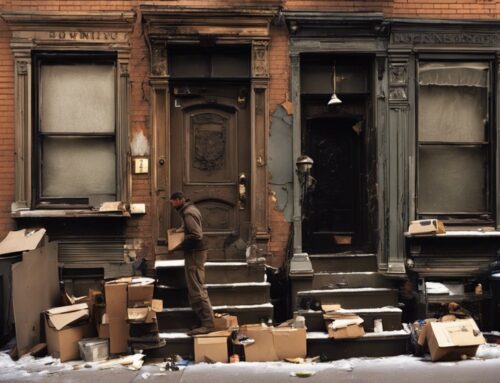You might think locksmith laws are fairly standard across the board, but New York's regulations set a higher bar. In this region, stringent licensing requirements, background checks, and detailed record-keeping are non-negotiable for legal operation. The potential penalties for non-compliance can be severe, making it essential for locksmiths to navigate these laws carefully. What do you need to know about the application process and what distinguishes New York from other areas?
Key Takeaways
- NYC requires locksmiths to be licensed by the DCWP, with strict adherence to local regulations and compliance rules.
- A minimum age of 18 and completion of an accredited locksmith program are prerequisites for obtaining a locksmith license in NYC.
- Locksmiths must maintain meticulous records of all jobs, including client information, which is crucial for compliance and professionalism.
- Violating locksmith regulations in NYC can lead to significant fines, penalties, and even revocation of the locksmith license.
- Regional differences in locksmith laws may affect licensing requirements, training programs, and operational practices across New York State.
Licensing Requirements Overview
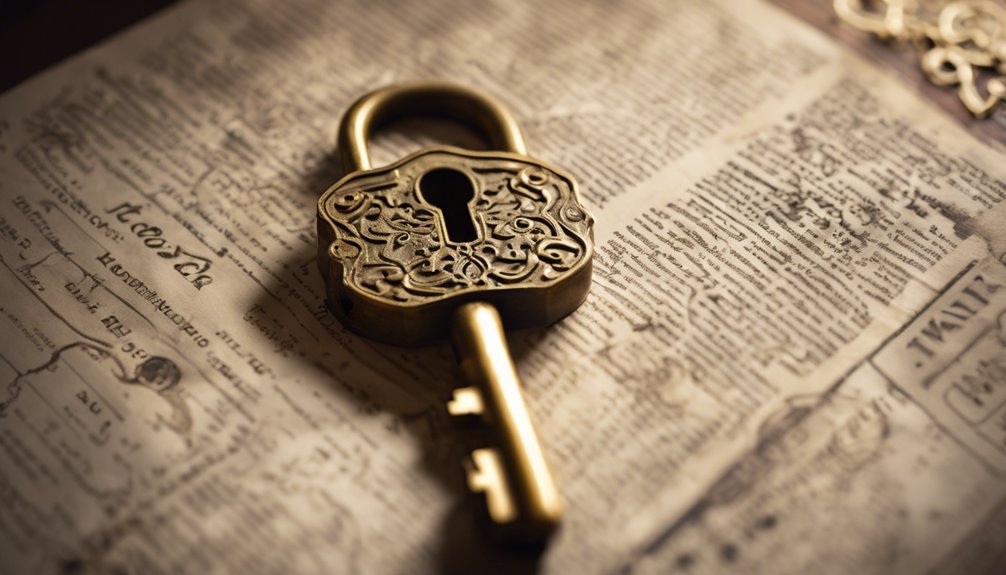
In New York, you must meet specific licensing requirements to operate as a locksmith. The New York City Department of Consumer and Worker Protection (DCWP) issues licenses, and it's vital to obtain one before offering your services. Operating without a license is illegal and may jeopardize your ability to work freely in this field. The licensing fee is $50, a small investment for a legitimate vocation.
To qualify for a locksmith license, you need to be at least 18 years old and provide proof of completing an accredited locksmithing program. This guarantees you possess the necessary skills and knowledge. Fingerprinting is required to conduct a criminal background check, reinforcing public safety and trust. Additionally, you'll need a current color passport-size photo and photo identification.
Once licensed, maintaining operational regulations is fundamental. You must keep meticulous records of every job, including client information and details of the work performed. Verification of identification and ownership is mandatory before accessing any items, underscoring the importance of ethical practice in locksmithing. The signature or mark of the requester must also be obtained for accountability.
For itinerant locksmiths, there are specific regulations, such as displaying your license on your person or in your work kit. Confirm you remain free from disqualifying criminal convictions and adhere to all compliance requirements, including submitting necessary certifications. Moreover, successful locksmiths typically undergo continuing education to stay updated with new technologies and techniques in the field.
Application and Renewal Process
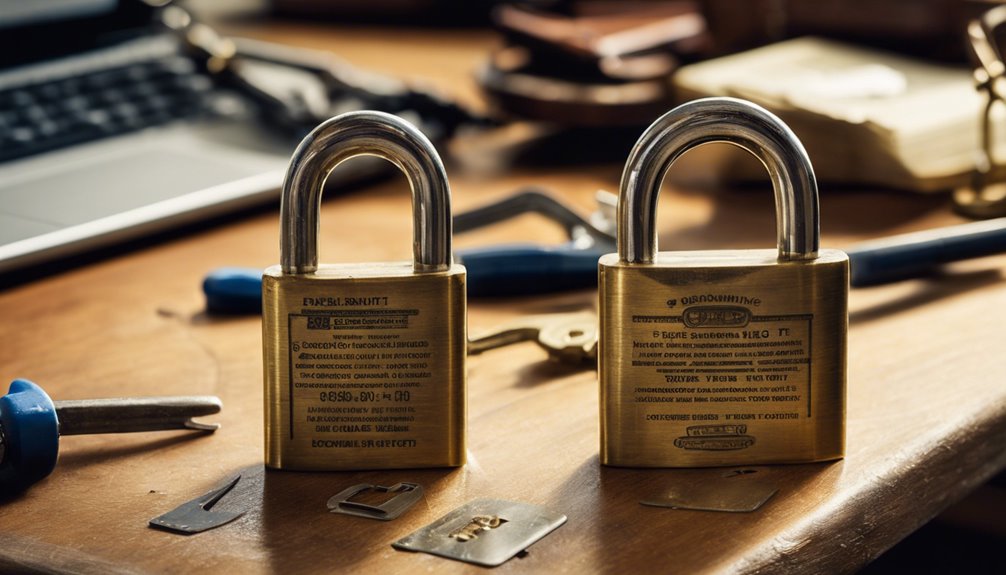
Steering through the application and renewal process for a locksmith license in New York requires attention to detail and adherence to specific guidelines.
First, you'll need to gather the required documents: a photo ID, a current color passport photo, proof of your locksmith's certificate, and fingerprints. You can submit your application either online or in-person at the NYC Department of Consumer and Worker Protection (DCWP). Be prepared to undergo a criminal background check, with the necessary processing fee paid at the Licensing Center. Furthermore, the city mandates that you have completed locksmith training programs before obtaining your license. Additionally, ensure that you provide proof of your locksmith qualifications as stipulated by the DCA. The application process also ensures compliance with the SAFE Act, which aims to enhance safety and security standards in the industry.
Applications aren't instantly approved; they'll go through a review process, and you'll receive an approval notification via email.
Renewing your license follows a structured timeline, becoming possible three months before expiration. You can renew online or via a mailed notice. You'll need to confirm your criminal history, child support status, and completion of continuing education.
Make certain to pay the renewal fee by credit card; you'll see the amount before finalizing the transaction. Expect your application to be processed within 2-4 weeks.
If you've had any changes in your business or personal information, you'll need to take additional steps. Address changes can't be submitted online, while name changes require contacting customer service for specific guidance.
Always keep track of your renewal notifications and print out the confirmation page to understand that your renewal is in progress. Adhering to these procedures guarantees you maintain your licensing status without unnecessary delays.
Qualifications and Examinations

When pursuing a locksmith license in New York, you need to provide thorough documentation of your qualifications, which typically includes a combination of education and experience. It's important to note that operating without a license can lead to severe consequences, which highlights the necessity of complying with legal standards. Additionally, understanding your legal responsibilities regarding master key systems is crucial for maintaining compliance with security regulations.
You'll find that the examination processes vary, with some positions requiring tests to assess your relevant knowledge and skills. Additionally, a license is required for mechanical lock services, emphasizing the importance of understanding the regulations surrounding your profession. It's crucial to understand these requirements fully to guarantee you meet the necessary criteria for your desired role.
Documentation of Qualifications
To secure a locksmith license in New York, you must provide specific documentation that demonstrates your qualifications. Acceptable forms include two certificates from licensed New York City locksmiths recommending you, a letter from Local Union No. 74 stating you've completed an accredited locksmithing course, or a certificate from a state-licensed school verifying your training. Furthermore, understanding the legal steps for changing locks after eviction is crucial, as it outlines the compliance required by locksmiths.
These documents serve as essential evidence of your competency in the locksmith field and must be approved by the commissioner before proceeding with your licensing process.
You can also gain credit for relevant experience; six months of acceptable experience can offset a year of education, whether from locksmith schooling or as an apprentice. Institutions like the Charles Stuart School of Locksmithing are recognized, and apprenticeships under licensed locksmiths are valid training methods.
Additionally, be prepared for fingerprinting and a background check to assess your criminal history, as certain convictions may affect your eligibility.
Keep in mind that locksmith trainees must work under direct supervision and comply with regulations. This documentation not only illustrates your qualifications but is crucial for ensuring the integrity and professionalism of the locksmithing profession in New York. Furthermore, understanding the role of locksmiths in eviction procedures is essential for operating within legal and ethical boundaries in professional practice.
Examination Requirement Process
While many professions require extensive examinations for licensing, the process for obtaining a locksmith license in New York City is particularly straightforward, as no exam is mandated for the general locksmith license. This streamlined approach allows you to quickly enter the workforce without the hurdle of a licensing exam. Additionally, understanding the difference between rekeying and replacing locks can inform your practice and enhance customer service.
If you choose the apprenticeship route, the path looks slightly different. You'll need to accumulate 8,000 hours of training, which focuses on essential skills like identifying various lock types and fabricating keys. However, the apprenticeship itself doesn't involve a mandatory examination.
After completing your apprenticeship, you can pursue certification from the Associated Locksmiths of America (ALOA), requiring you to pass a 250-question exam administered at a separate facility.
Although the ALOA certification isn't necessary for your NYC locksmith license, it's a valuable credential that can enhance your qualifications. Resources for study, including practice tests and online classes, are available through ALOA, ensuring you're well-prepared should you opt for certification. Additionally, understanding legal risks in the locksmith profession can help you operate more safely and reduce potential liabilities.
To summarize, while New York's locksmith licensing is accessible, pursuing further credentials through ALOA can deepen your expertise in the field.
Prohibitions and Restrictions
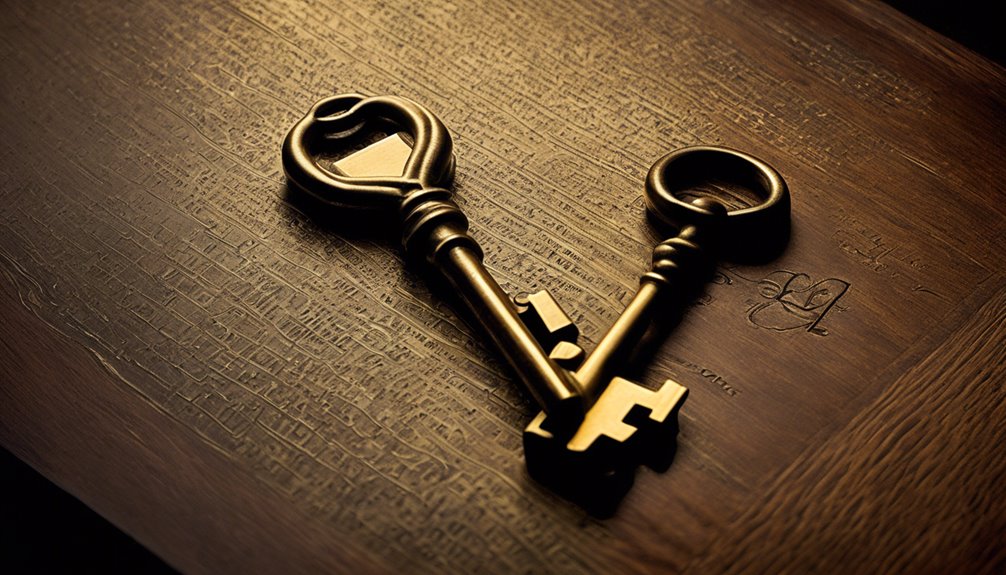
When it comes to locksmith employment in New York, strict prohibitions exist regarding unlicensed activities.
You're not allowed to perform any locksmith services, including opening locks or creating keys, without the proper license. Additionally, licensed locksmiths face mandatory requirements to display their licenses and supervise any trainees under their guidance. Furthermore, locksmiths must adhere to New York's lock picking laws to remain compliant with legal regulations. Compliance with these laws is crucial, as using tools for lock bumping without proper licensing can lead to legal repercussions.
Unlicensed Locksmith Activities
In New York, individuals engaging in unlicensed locksmith activities face strict prohibitions that protect both consumers and the integrity of the profession. Unlicensed locksmiths aren't only limited in the services they can provide, but they also risk significant penalties for violating the law.
Here are key restrictions you should be aware of:
- Opening locks without authorization or lost keys is unlawful.
- Making repairs or adjustments to locks is prohibited.
- Creating original keys or devices to open locks is off-limits.
- Performing locksmith services without a proper license violates the NYC code.
- Penalties may involve fines, discontinuation of activities, or sealing of premises.
These regulations guarantee that locksmith services remain secure and reliable.
When you hire a locksmith, it's vital to confirm their credentials. The law empowers licensed professionals to guarantee the services are performed safely and responsibly, hence maintaining trust within the community.
You need to be aware of these prohibitions to protect yourself, your property, and your rights as a consumer.
Mandatory License Display
Understanding the importance of license display in the locksmith profession is essential to maintaining transparency and trust between service providers and consumers. Licensed locksmiths must prominently display their licenses in a conspicuous location where they can be easily seen by anyone entering their premises.
This requirement extends to employed locksmiths, ensuring that clients can verify the locksmith's credentials at a glance.
For itinerant locksmiths, the rules are equally stringent. You're required to carry your license on your person or have it visibly displayed on your working kit or vehicle. This visibility plays a vital role in identifying licensed professionals, thereby bolstering consumer confidence in your services.
Complying with these display regulations isn't just an option; it's a legal obligation. Failure to properly display your license can lead to significant penalties, including fines and potential revocation of your license.
Regulatory authorities actively monitor compliance to protect consumers and uphold industry standards. By adhering to the mandatory license display rules, you can contribute to a more trustworthy locksmith industry while safeguarding your professional standing.
Supervising Trainee Regulations
Although regulations may seem restrictive, supervising trainee regulations are essential for guaranteeing safe and effective locksmith practices.
As a trainee, you must remember that your training and the supervision you receive play a significant role in moving to a licensed professional.
Here's what you need to keep in mind:
- You must possess a trainee license to work under a licensed locksmith.
- Direct supervision by a licensed locksmith is mandatory at all times.
- Your training period is capped at thirty-six months.
- Licensed locksmith employers must notify the department of any employment changes related to you.
- You can only perform tasks as outlined in your training and under supervision.
These regulations aim to protect both you and the public.
By adhering to these guidelines, you guarantee that you're gaining the necessary skills in a responsible manner, contributing to the integrity of the locksmith profession.
Remember, while you may crave independence, it's vital to build a solid foundation under expert guidance.
This ultimately leads to the freedom to operate effectively in your future locksmith career.
Exemptions to Licensing
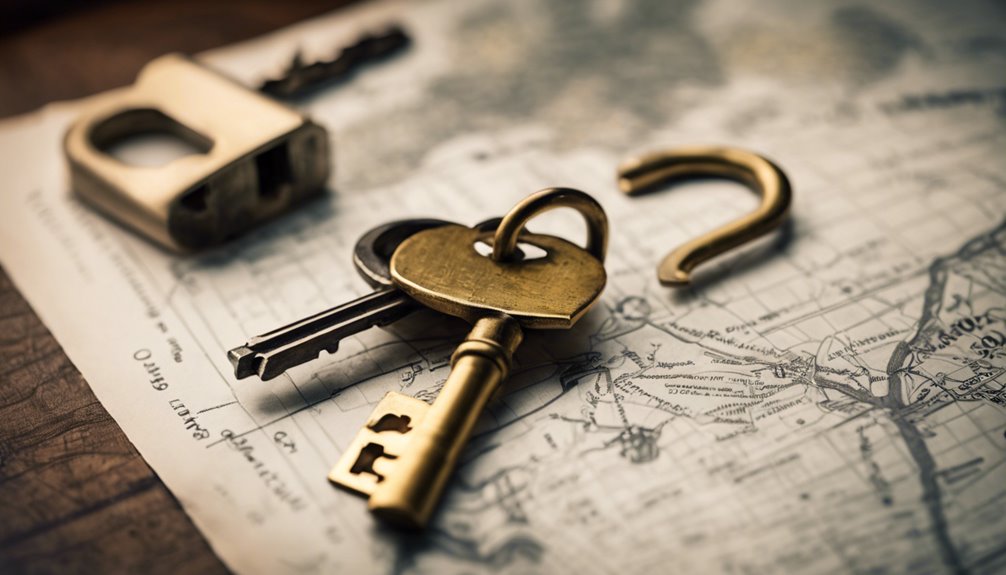
While many activities related to locksmithing require a license in New York, specific exemptions do exist that allow individuals to perform certain tasks without formal certification. For example, you can make duplicate keys at hardware stores without needing a locksmith license. Similarly, if you're modifying locks as the manufacturer intended, you're free to proceed without certification. Mechanics and auto dealers can also repair automotive locks under their profession.
Certain professions receive further exemptions, allowing security systems technicians to install replacement locks without a locksmith license. If you're a landlord or property manager, rekeying locks on rental properties typically doesn't require licensing either.
It's crucial to recognize that exemptions may vary, not only by state but also by local regulations. For example, some states, such as Maryland, necessitate licenses for businesses rather than individual practitioners, potentially leading to further variations in responsibilities.
In New York City, however, compliance with regulations from the Department of Consumer Affairs or the Department of Consumer and Worker Protection is critical. While general exemptions apply to tasks outside locksmith licensing, core locksmith services like repairing, servicing, or installing locks don't escape the licensing requirements.
Always check with local authorities to clarify applicable exemptions and regulations, as new laws can reshape these requirements. Understanding these nuances allows you to navigate the locksmithing landscape effectively while enjoying the freedoms granted by these exemptions.
Enforcement and Penalties

The enforcement of locksmith employment laws in New York hinges on several key mechanisms designed to uphold industry standards and confirm compliance. Enforcing these laws is essential for guaranteeing that locksmiths operate fairly and ethically. The Bureau of Public Work and Prevailing Wage Enforcement investigates complaints, while the NYC Department of Consumer Affairs (DCA) oversees licensing and compliance, conducting investigations and inspections.
Key aspects of enforcement and penalties include:
- Daily fines of $100 for operating without a locksmith license.
- Penalty ranges of $375 to $500 for various violations, increasing for repeat offenses.
- Potential license suspension or revocation for serious or repeated violations.
- Consequences for willful violations can lead to debarment from public work projects.
- Increased scrutiny for prior offenses involving dishonesty or non-reporting.
These enforcement mechanisms are integral to maintaining a professional locksmithing environment. If you fail to comply with the stipulated regulations, the penalties can escalate quickly.
The DCA actively issues notices of violation, and the cumulative effects of repeated violations can severely impact your ability to operate. Additionally, improper posting of licenses or failure to provide customer copies can lead to further penalties.
Understanding these laws and adhering to them not only protects you but also fortifies the integrity of the locksmith profession as a whole. Engaging with the prescribed regulations confirms your license remains intact and your business flourishes within New York's legal framework.
Frequently Asked Questions
Can I Operate as a Locksmith Without a License in NYC?
You can't operate as a locksmith without a license in NYC. Doing so incurs daily penalties and potentially harsh fines.
The law mandates that you secure proper licensing to protect both yourself and your clients. While it might be tempting to bypass these regulations for freedom, operating unlawfully can lead to serious consequences, including license revocation.
To maintain your business integrity, make certain you follow the necessary steps to obtain your locksmith license.
What Happens if My License Application Is Denied?
If your license application's denied, don't lose hope.
First, you'll receive written notice explaining the reasons for the denial. You can appeal this decision by submitting a detailed written request within a specified timeframe.
Gather any necessary documentation to support your case. Focus on addressing the denial reasons and demonstrating your qualifications.
If the appeal's upheld, you can reapply later, so stay proactive and committed to improving your application.
How Can I Check the Status of My License Application?
To check the status of your license application, log in to your online account with the NYC Department of Consumer Affairs.
Alternatively, you can visit the DCWP Licensing Center by appointment or contact them via phone at (212) 436-0441.
For email inquiries, use LicensingAppointments@dcwp.nyc.gov.
Remember to keep track of any required documents and updates posted on the DCA website to guarantee your application moves forward smoothly.
Are There Any Continuing Education Requirements for Licensed Locksmiths?
Think of your locksmith license like a well-oiled machine—smooth, but it doesn't need ongoing maintenance.
In New York City, there aren't any continuing education requirements for licensed locksmiths. You don't have to worry about annual training or credits to keep your license current.
Once you pass your initial licensing and background checks, you're free to operate without added educational burdens, allowing you to focus on perfecting your craft and meeting client needs.
What Should I Do if My License Is Lost or Stolen?
If you lose your license or find it stolen, act quickly.
Notify the NYC Department of Consumer and Worker Protection (DCWP) immediately, providing details of the incident.
File a police report if it was stolen.
Complete a replacement application, pay the fee, and submit everything to the DCWP Licensing Center.
To prevent unauthorized use, ask the DCWP to invalidate the lost license in their database and stay vigilant for any misuse.
Conclusion
Maneuvering locksmith employment laws in New York feels like walking a tightrope—one misstep could lead to hefty fines or lost licenses. By understanding the licensing requirements and staying compliant, you guarantee a secure future for your business. Picture yourself with a shining key in hand, revealing opportunities while adhering to the regulations laid out before you. To thrive in this vibrant market, remain vigilant and informed; it's not just about opening doors, but also about safeguarding your professional integrity.

